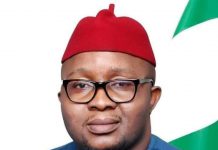Nigeria is a country where nothing that went wrong ever became right again. This ‘aphorism’ is with one exception, which is the long awaited return to civil rule after decades of military dictatorship. Apart from just this one relief from the grief of atrocious junta rulers, citizens have never been availed of any sort of reprieve whatsoever. Even, after the civil war, things went awry the more in that the poor masses become more down trodden and oppressed by the elite. Everything went comatose, including the nation herself. The inevitable change from one regime to another under the same dispensation or from one era of different dispensations made little or no significant difference. Consequently, the people are often confronted with despicable situations of gloom and despondency. This explains why after about fifty four (54) years of independence and about fifty one (51) years of political sovereignty this country refused to move forward but kept perambulating. To worsen the case is the regrettable disposition of the masses towards complacency especially the post – civil war generation. It appears that they have actually mortgaged their political status as the majority which is obviously advantageous in directing the socio-political pendulum of a nation. It was Karl Max that predicted the dictator ate of the proletariats when the bourgeoisie class was over bearing and over-stretched the resilience of the common people. Similarly, the Nigeria elite have almost become bereft of ideas, and the Messiah is not yet in sight. Orison Swett did say that “We starve ourselves in the midst of plenty, because of our strangling thought”. But, S Firestone collaborated it when he said; “thought, not money is the real business capital, and if you know absolutely that what you are abound to accomplish is in the season”. This takes me aback to a fable about the short story of the four some; “there were four people named everybody, somebody, anybody and nobody”. Now, there was a piece of job to be done and everybody was sure that somebody would do it. Anybody could have done it but nobody did it. Somebody got angry about that, because it was everybody’s job. Everybody thought anybody could do it but, nobody realized that everybody would not do it. It ended up that everybody blamed somebody when nobody did what anybody could have done” friends and readers alike, this scenario applies mistakenly to Nigeria which is now engrossed in a national lake syndrome where everybody aspire to access the Aso Rock Village (that Hill of corruption) where the high and mighty gather to mock the rest underprivileged masses. We are yet to have true and sincere leaders.
Pray, God! Grant me the serenity to accept the things I cannot change, the courage to change the things I can, and the wisdom to know the difference. Truly, nobody plans to fail but many fail to plan. Our leaders have indeed failed us and we are forlorn because our confidence find nowhere to repose but on God alone. Education makes a people easier to rule but difficult to enslave. Having strangled and mangled other key sectors of the economy like, industrial, health, agricultural, power, transportation and aviation, communication (partially courtesy of GSM), the jabs are against education to kill it. It is a conspiracy by the ruling class to castrate the masses who supposedly own the power as the electorates. Once the ruling class succeeds in destroying the education system they would have emasculated the electorates to manipulate able stratum of the society. To this er,d, denial of qualitative and formal education is an instrument of warfare devised consciously by the wicked leadership of Nigeria whose wards are accessible to quality education in the high brow Ivy League institutions situated overseas. When the legislators summoned the clouts to request for rosy conditions of services and higher remuneration, even to the extent of demanding for life pension for their principal actors upon retirement, they are reluctant to revamp or at least rescue the ailing education from tottering into structural shambles. While education sector that ought to be the engine room of technological take off and economic growth is suffering a gross under-funding, the Federal Government of Nigeria (FGN) willingly approve prohibitive pay pockets for the ……. In their business of rolling out selfish laws, and even approved whooping sums of money for issues as frivolous as first lady’s guest house meant
to gulp about four billion Naira. From the primary schools to tertiary institutions, the public schools are neglected, under funded and relegated to an inferior status where only the less privileged resort to for half-baked education. Recently, the Polytechnics across the entire country embarked on work-to-rule action that lasted for about three (3) months asking for improved standards and conditions Chief among the other demands of the Academic Staff Union of Polytechnics (ASUP) were the harmonsing of polytechnic education to meet with the equivalent of universities as having a regulatory commission instead of the National Board for Technical education (NBTE) doing the yeoman’s job that is degrading and quite under-rating the polytechnic education.
Both the national executives and legislatures with their state counterparts allowed such abnormal situation to linger and drag down the education system out of sheer tyramy and insouciance. It smacks of negligence and conscious conspiracy occasioned by poor statecraft. As at the time of this write up, the Non-Academic Staff Union of the Polytechnics are on indefinite strike agitating for reasonable condition of services. Also, the Academic Staff Union of Universities ASUU embarked on strike for the umpteenth time putting pressure for the FGN to implement an agreement reached way back 2009. Instead of addressing these issues and seeking to restore lost glory in the sector, the FGN is politicking by insisting on a fresh negotiation of re-negotiation. This is quite unfair and unacceptable, a position which ASUU took to resist procrastination. It is pretentious for the FGN to claim ignorance of the damage inflicted on the society with spates of profligate spending whereas a sector as vital as education is neglected. It is equally worrisome that bad governance and financial misappropriation have exacerbated poverty in this country that the common man in the street can hardly enjoy the three (3) basic necessities of life; food, clothing and shelter. It is incredible to observe that Nigeria gropes under the burden of a shame of 17 million housing deficit (this implies that the estimate of 17 million Nigerians do not have roof over their heads – (comfortable and affordable) accommodation. What a paradox akin to the saying that one gets thirsty while in the pool of water. Given the copious wealth of abundant natural and human resources, this country is ravaged by ethnic poverty due to acute dearth of food security. The oil boom has brought us a doom in that the agricultural sector that hitherto was the mainstay of the Nigeria’s economy was abandoned to the extent that ordinary citizen can not boast of three square meals. The discernible taints of planlessness and executive recklessness plunged a rich and naturally gifted country into a deep miasma of mono-economy and import dependence. It is shameful that far poorer nations like Ghana that was formerly a mockery stock when the jocular made the rounds that “Ghana must go” (of which a popular bag signifies), but v which turned around to retaliate Nigeria as a most recent laughing stock being subjected to stiffer diplomatic commercial and immigration conditions (now Ghana has a popular bag nicknamed p “Nigeria must come) because their economy is better and investment environment more clement with a background of more tested political stability. It is on record that some multi-nationals closed shops in Nigeria to open up new outlet in Ghana including our highly demyfied shell petroleum in t the much coveted oil sector. The capable and foresighted parents prefer their wards being H educated in Ghana Schools where the system is stable (the curriculum and calendar sustainable and standard non-compromised). Our predicament became woeful and laughable when the British I government tightened their immigration conditions against seven countries to include: Nigeria, w(. Pakistan, Srilanka, Ghana, etc requiring a three (£3,000) thousand pounds from the nationals as condition for the issuance of entry visa to U.K. All these are pointers that a visionless leadership is not a virtue at all, rather an aberration that is quite enigmatic. It is doubtful that our ruling classes (elite) are actually educated. If not so, any reason for not treasuring the dividends of qualitative and quantitative education for posterity. What would distract good leadership from ensuring that the fundamental rights of our children to have education are paramount in priority? Education is a key to success, a security for old age and the fastest way to evade poverty. A healthy and virile education system for Nigeria is the only reliable assurance for the future and a lasting legacy. So, watching the Nigeria education system pant to a painful point of asphyxiation is the greatest blunder bound to spell a doom. Please, something decisively needs be done with utmost dispatch too, to forestall calamity.
Welcome!Log into your account










